At WAC, Kilgore photos capture vulnerability, hope, connection, community in Fayetteville
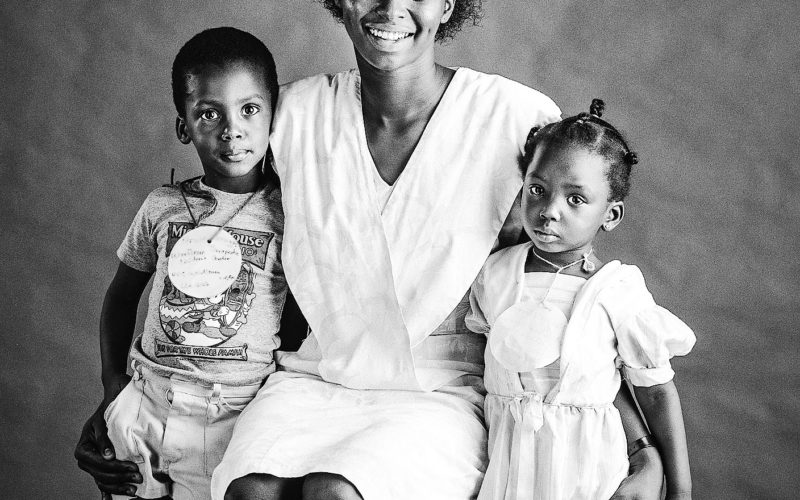
BECCA MARTIN-BROWN
bmartin@nwaonline.com
“I photograph these people because I love them,” Andrew Kilgore says of the work he has done for much of his life. “When I open my eyes and my heart to someone whose vulnerability has so clearly defined their very being, I experience the deepest level of ineffable connection. And the best word that I have for that profound experience of connection is love.”
What sets Kilgore apart from other photographers is the commitment he has to capturing in his images “people who have been stigmatized for a wide range of reasons and pushed out to the edge of our mainstream culture.” He calls this his “advocacy work,” and it is the heart of an exhibition of his work, “Andrew Kilgore: 100 Photographs,” on show through March 19 at the Walton Arts Center in Fayetteville.
“Andrew has given Fayetteville its visual history beginning in the early ‘70s — capturing the true essence of the times and of its people,” says exhibit curator Kathy P. Thompson. She says that after working with Kilgore since June 2022 to wade through just a portion of his 750,000 images, “there are a few that come right up when I close my eyes. These images are of the people who are the homeless and forgotten in our society and also several of the shots of Fayetteville in my early days — as I say, he shows the way Fayetteville used to be.”
His life’s work didn’t start in Fayetteville, Kilgore says. An itinerant childhood — Charlottesville, Va., Chicago, Western Springs, Ill., Aurora, Ill., then El Paso Texas — was followed by college at Earlham, a small Quaker college in Richmond, Ind., before Kilgore moved to New York City to attend Union Theological Seminary. He ended up studying acting with Stella Adler, but it was the era of the Vietnam conflict and, according to the Arkansas Encyclopedia, Kilgore joined the Peace Corps when his draft status was changed to 1-A. After two years in India, carrying a camera he had purchased in Hong Kong, he moved to Austin, Texas, in 1969, and the trajectory of his artistic career was set.
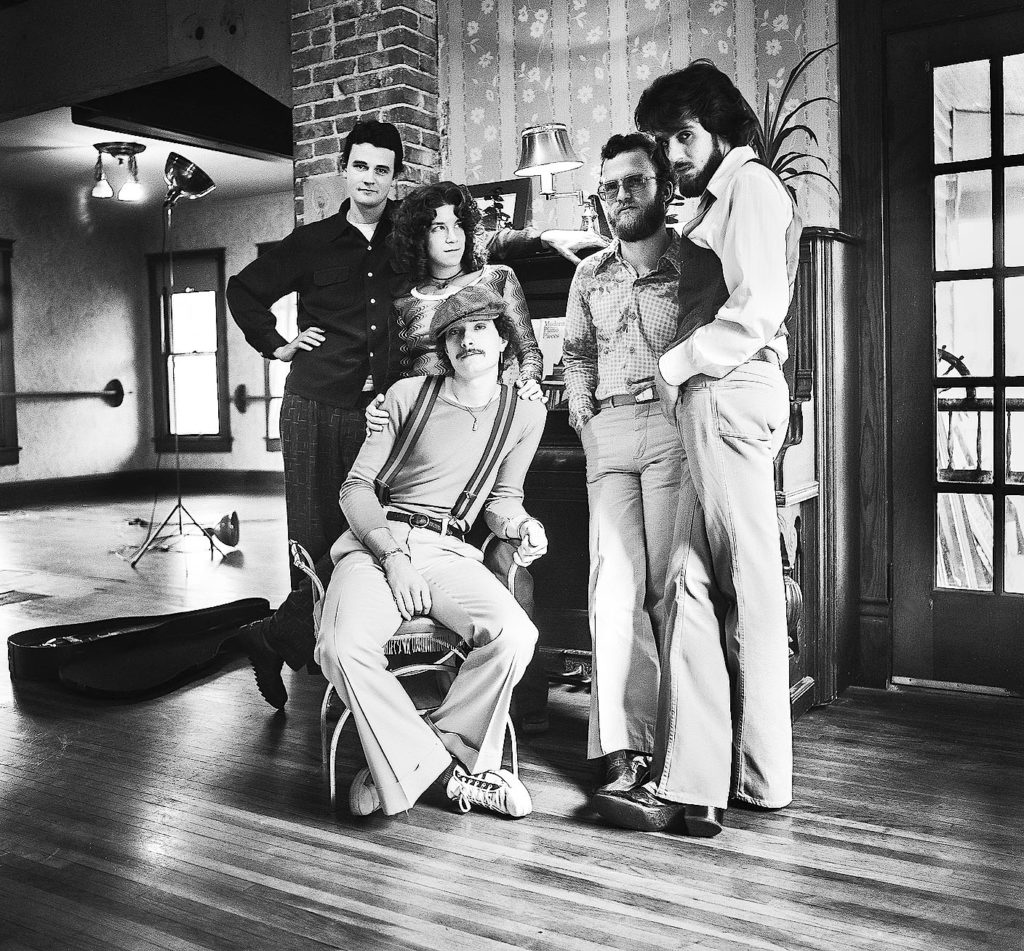
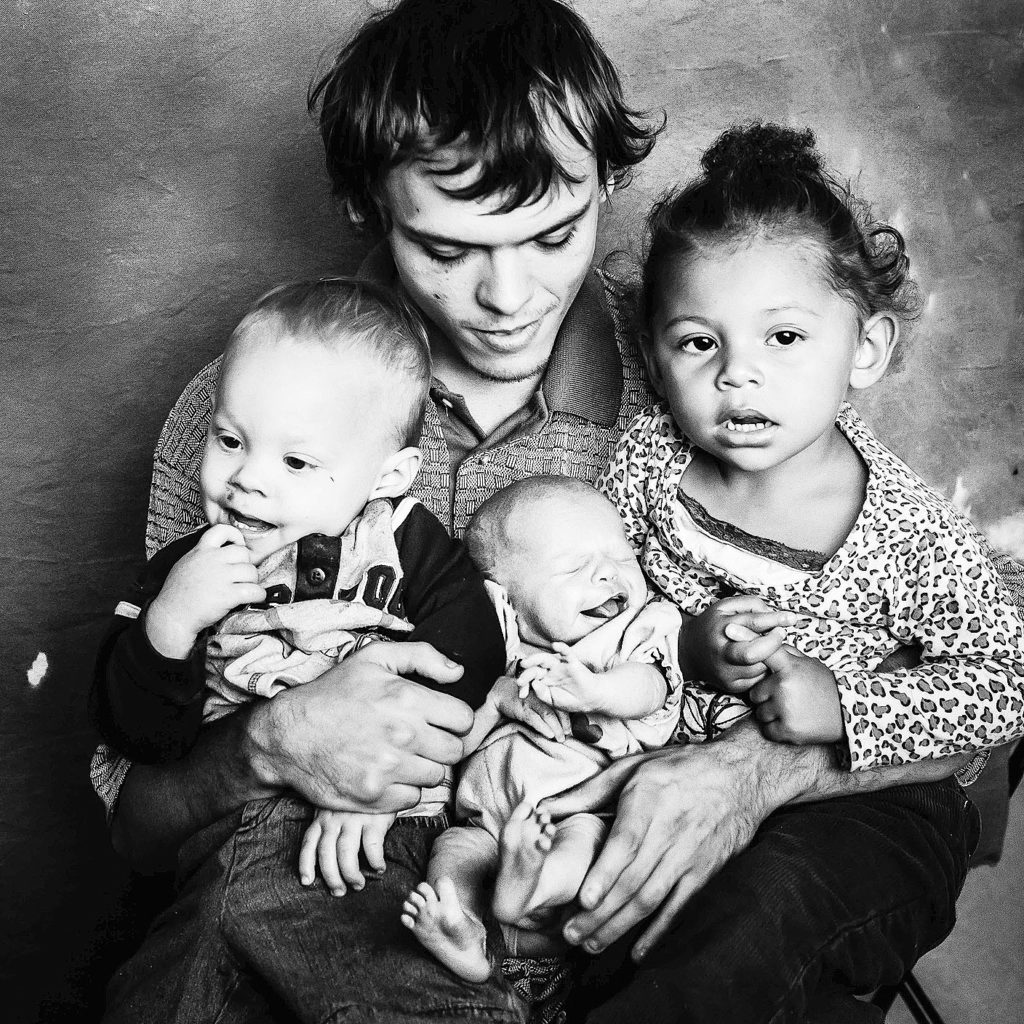
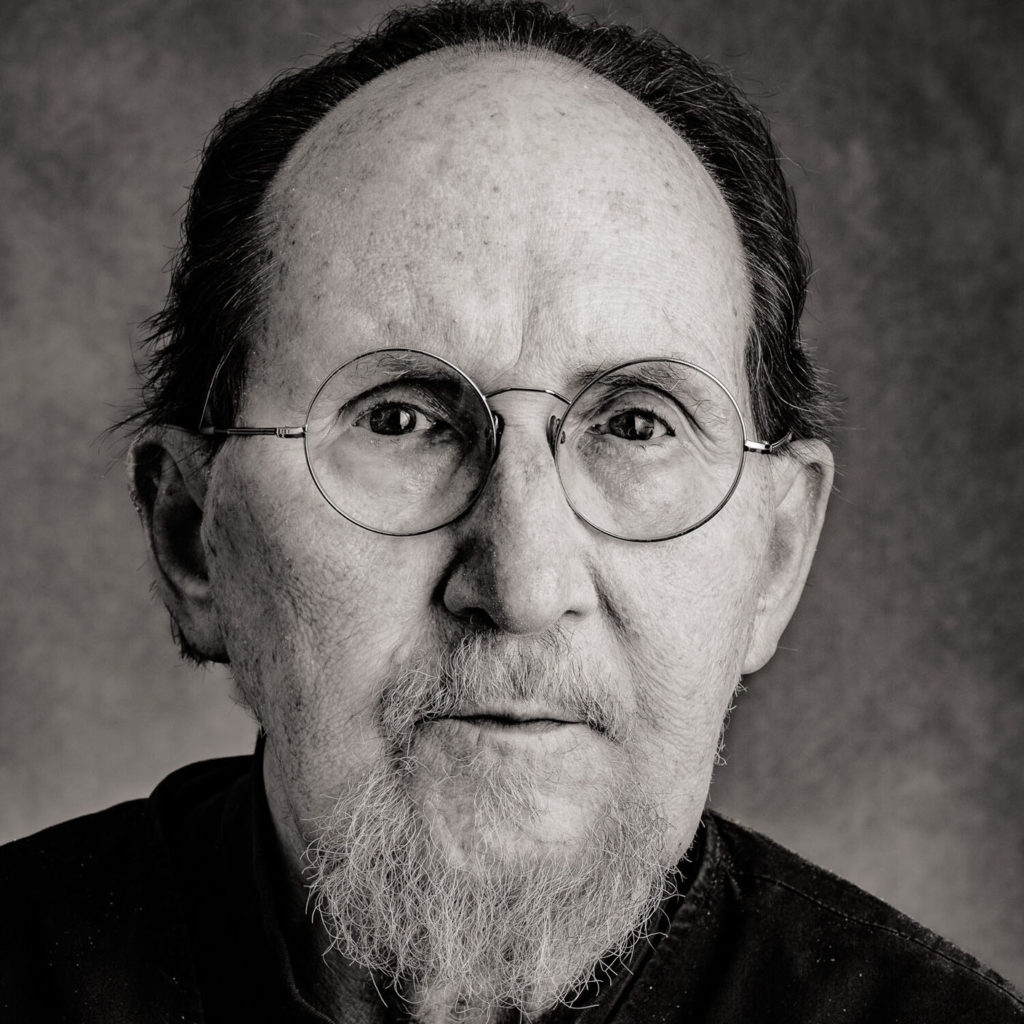
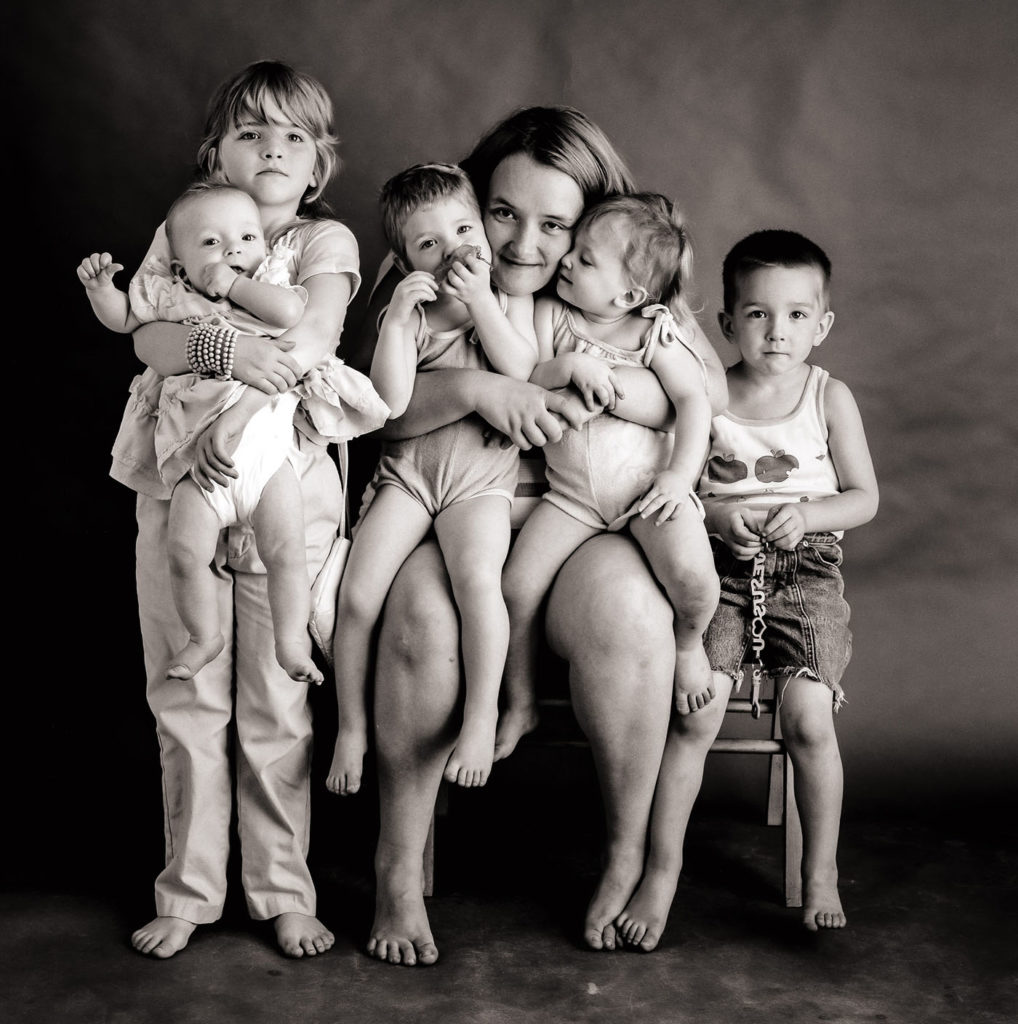
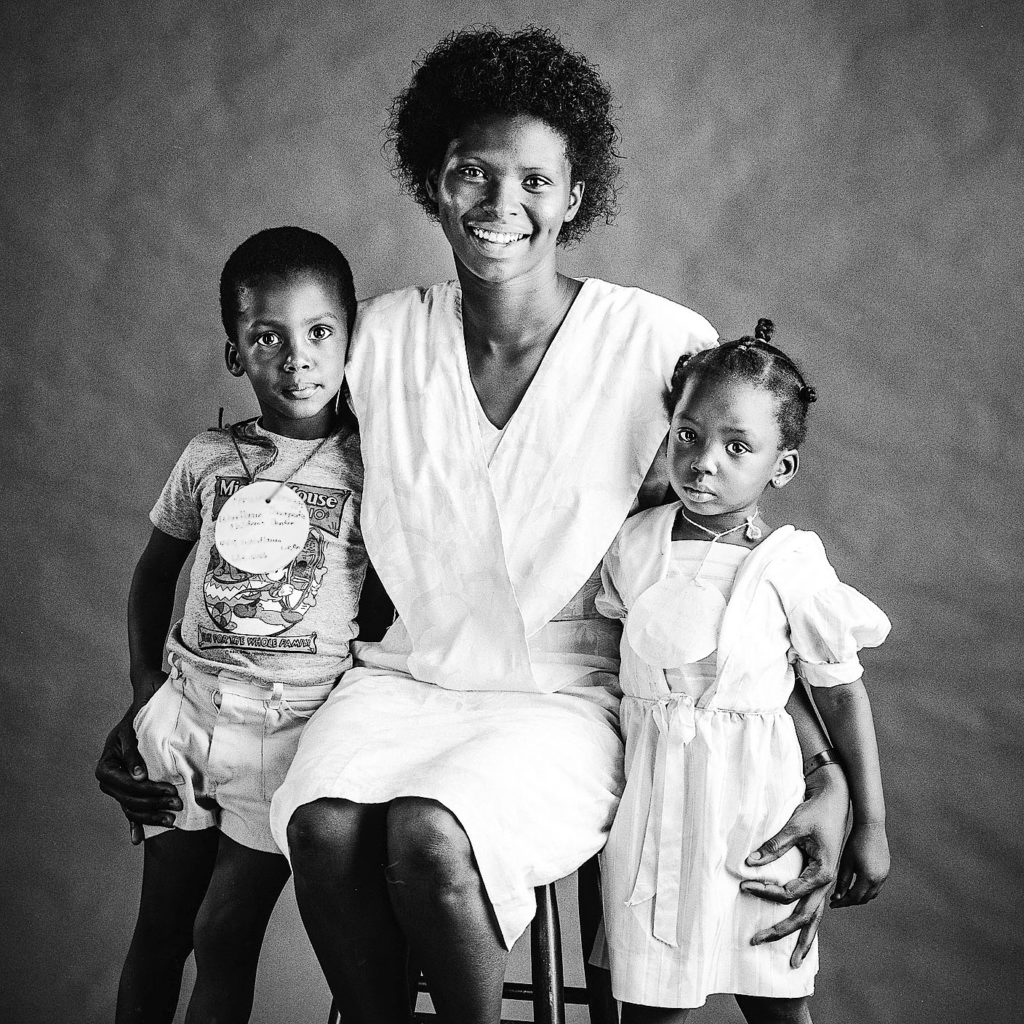
“I was working on a special project with institutionalized children who were both blind and medically diagnosed with what at the time was termed ‘severe mental retardation’ in the state school for people with developmental disabilities,” Kilgore remembers. “I started taking my camera out and photographing the kids. Two of those pictures are in this exhibition. One of them is the signature piece.”
In 1971, following his stay in Austin, Kilgore was on his way to San Francisco, the Arkansas Encyclopedia chronicles, and stopped in Fayetteville to visit friends.
“I came here by accident, but after I was here for about six months I sat down and made a very deliberate choice to stay here and spend my life and career here,” the Encyclopedia quotes Kilgore as saying. “I knew it might not have the rewards of a broader reputation as a photographer but that it would give me a great deal of freedom and a population of people that I had really come to love and respect.
“My first few years in Fayetteville, I was an itinerant hippie,” he adds in an interview for this story. “In 1973, I was hired to teach photography in the art department at the University. I was fired from that job in 1977 because I had never taken any art courses when I was in college. So they hired somebody who had a degree in it. I started working on a special project called the Fayetteville Townsfolk Portfolio Project in 1976. That was when I began to develop my particular way of photographing people.”
His projects, according to the Encyclopedia, have also included “We Drew a Circle,” consisting of 80 images of the developmentally disabled, funded by Stephens Inc. and the National Endowment for the Humanities and exhibited around the nation; “Keeping In Touch,” which was a project for the Arkansas AIDS Foundation; “Arkansas People,” a project for the Arkansas Sesquicentennial in 1986, spawning a book of the same name; “Healing Changes,” a series of images of the mentally ill; and “Community Meals (A Reluctance to Engage),” a series of photographs of the homeless/jobless in which Kilgore exchanged a $20 bill for the right to take a subject’s photograph.
“His cumulative work fosters a sense of belonging for all who sat in front of his camera and those who view the resulting photographs,” says WAC spokeswoman Jennifer Wilson. “[And] in planning for the exhibition, our team realized that adding an audio component would bring the pictures of these individuals to life. We knew several of the people in the pictures had been featured in KUAF stories, and we thought giving KUAF the opportunity to talk to Andrew about several of the photos in the exhibit would give people a chance to hear from him directly. So we partnered with KUAF for this show.”
“KUAF is the audio curator of the exhibition — meaning we have identified six archived interviews, segments and songs that correspond with six photographs in the exhibition,” explains Leigh Wood, KUAF executive director. “Some of the featured audio pieces are of Gov. Bill Clinton, announcing his candidacy for President of the United States in 1991; Daisy Bates, speaking with Sharita Patterson of ‘Ozarks at Large’ on being recognized by the UA and NWA Communities in 1996; and the only recordings of Sarge and Shirley West, country music artists who toured with Merle Haggard and Tom T. Hall and were an integral part of the neighborhoods in south Fayetteville.”
In addition to QR codes that allow visitors to the exhibition to hear the KUAF segments, all of the archived audio pieces are available on the station’s website at kuaf.com. Wood says it was the perfect partnership.
“Andrew Kilgore has chronicled the residents of Fayetteville for 50 years and in doing so, his photographs tell the story of Fayetteville’s residents and its history. KUAF has done the same thing over the last three and half decades — recording the stories, voices, experiences, and events of our community. And although radio is ephemeral, this gave KUAF the chance to scour our archives to create a collection of audio pieces that tell the same story of the people, stories and history of where we live.
“While we undergo tremendous changes as a community, this collaboration is important in its celebration of the residents of Fayetteville,” she goes on. “Andrew’s genius is in his ability to capture the true essence of the people he is photographing and being able to view these striking portraits, while also hearing the voices of the people in the photographs, puts you in a time and place with that person. It immerses you in their story. That is what KUAF wanted to lend to this exhibition – the experience of connection through sound and art.”
In March, the Arkansas Arts Council will also honor Kilgore with the 2023 Governor’s Arts Award for Lifetime Achievement, joining the ranks of icons like Charles Banks Wilson and George Dombek.
“Andrew Kilgore is a perfect match for the Lifetime Achievement Award category,” says program director Cheri Leffew. “At age 82, his black-and-white portrait photography is distinctly recognizable. He was selected for the award because of the exceptional quality of his work, coupled with his focus on photographing groups of people who are frequently overlooked by society.”
Asked what he hopes comes of the WAC retrospective of his work, Kilgore says:
“For myself, I would love to be offered the funding to do another major advocacy project.
“For Walton Arts Center, I would love to see a continued emphasis and commitment to doing work with visual artists.
“I hope that viewers feel a deep sense of connection and empathy with the people in the pictures.”
As he says, “I photograph these people because I love them.”
FAQ
‘Andrew Kilgore:
100 Photographs’
WHEN — Through March 19; gallery hours are 10 a.m. to 2 p.m. Monday-Friday and one hour before most performances
WHERE — Joy Pratt Markham Gallery at the Walton Arts Center in Fayetteville
COST — Free
INFO — waltonartscenter.org; private tours may be scheduled by emailing visualarts@waltonartscenter.org
BONUS — There will be a conversation with Kilgore at 6 p.m. Feb. 26, in Joy Pratt Markham Gallery. This conversation is free and open to the public.
ACKNOWLEDGEMENTS — This project is supported in part by a grant from the Arkansas Humanities Council and the National Endowment for the Humanities. Exhibition underwriters are Hershey and Denise Garner.









